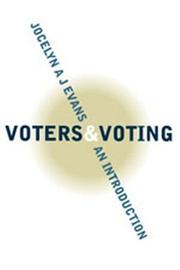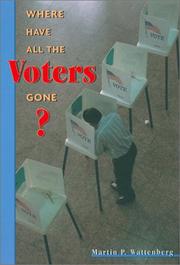| Listing 1 - 10 of 339 | << page >> |
Sort by
|
Book
ISBN: 1629488844 9781629488844 1629488704 9781629488707 Year: 2014 Publisher: New York
Abstract | Keywords | Export | Availability | Bookmark
 Loading...
Loading...Choose an application
- Reference Manager
- EndNote
- RefWorks (Direct export to RefWorks)
Book
ISBN: 1631178032 9781631178030 1631178024 9781631178023 Year: 2014 Publisher: New York : Nova Science Publishers,
Abstract | Keywords | Export | Availability | Bookmark
 Loading...
Loading...Choose an application
- Reference Manager
- EndNote
- RefWorks (Direct export to RefWorks)
The United States runs its elections unlike any other country in the world. Responsibility for elections is entrusted to local officials in approximately 8,000 different jurisdictions. In turn, they are subject to general oversight by officials most often chosen through a partisan appointment or election process. The point of contact for voters in the polling place is usually a temporary employee who has volunteered for one-day duty and has received only a few hours of training. These defining features of our electoral system, combined with the fact that Americans vote more frequently on more
Book
ISBN: 8132117484 8132116283 9788132116288 9788132110446 8132110447 Year: 2013 Publisher: New Delhi SAGE Publications
Abstract | Keywords | Export | Availability | Bookmark
 Loading...
Loading...Choose an application
- Reference Manager
- EndNote
- RefWorks (Direct export to RefWorks)
Measuring Voting Behaviour in India captures the dynamics of multiple methodologies used for measuring voting behavior in India in the past and present. The authors elaborate on various methods that are used for measuring voters' opinions, attitudes, and perceptions. They discuss the advantages and disadvantages of each method to capture the multiplicity of the electoral experience of diverse voters across different settings in India. This they accomplish utilizing their long experience of conducting national- and state-level election surveys in India and by simultaneous studies using
Voting research --- Voting --- Elections
Book
ISBN: 0774817852 1283335557 9786613335555 9780774817851 9781283335553 9780774859363 0774859369 9780774817837 0774817836 9780774817844 0774817844 Year: 2010 Publisher: Vancouver
Abstract | Keywords | Export | Availability | Bookmark
 Loading...
Loading...Choose an application
- Reference Manager
- EndNote
- RefWorks (Direct export to RefWorks)
The recent string of minority governments has reminded Canadians that voting behaviour has serious consequences � on the composition of government as well as on the direction of public policy. Understanding the underlying meaning of election results is a key issue for policy makers and for students and scholars of politics. But can voting behaviour be explained, given that each vote represents the influence of countless impressions, decisions, and attachments? Voting Behaviour in Canada reveals the challenges of understanding election results as leading young scholars of political behaviour piece together a comprehensive portrait of the modern Canadian voter. By systematically exploring long-standing attachments, short-term influences, and proximate factors (campaign issues and poll results), the contributors offer a multifaceted analysis of voting behaviour that incorporates the insights of theories developed to illuminate the influence of certain factors. Theoretically grounded and methodologically advanced, Voting Behaviour in Canada sheds new light on the choices we make as citizens and provides important insights into recent national developments.
Book
ISBN: 1280596716 9786613626547 0774819138 9780774819138 9780774819114 0774819111 Year: 2012 Publisher: Vancouver UBC Press
Abstract | Keywords | Export | Availability | Bookmark
 Loading...
Loading...Choose an application
- Reference Manager
- EndNote
- RefWorks (Direct export to RefWorks)
Why do Canadians vote the way they do? The primary objective of the ongoing Canadian Election Studies (CES) has been to investigate that question. After more than four decades of gathering and analyzing data, principal investigators of the CES come together in this volume to document the history of these surveys and consider their future. This wide-ranging collection of essays provides useful background and insights on the relevance of the CES, and lends perspective to the debate about where to steer the CES in the years ahead. Contributors outline how the CES project began and how far it has come, assess the quantity and types of data that have been collected, and explore the theoretical and methodological developments that have been involved. Looking toward the future, the book highlights the challenges that lie ahead and provides suggestions for change.
Book
ISBN: 3954895552 9783954895557 9783954890552 3954890550 9783954890552 Year: 2013 Publisher: Hamburg Anchor Academic Pub.
Abstract | Keywords | Export | Availability | Bookmark
 Loading...
Loading...Choose an application
- Reference Manager
- EndNote
- RefWorks (Direct export to RefWorks)
Hauptbeschreibung Eurobarometer shared recently that 41% of the EU citizens get their main information on European topics from daily newspapers. This is also the case for those citizens who decided on the adaption of the Lisbon treaty in the two nationwide referendums, in Ireland. But, as many media researchers showed, news coverage is biased. However, it has to be biased for it is simply not possible to report the entire reality in one article. One aspect of news bias is known under the term framing. Framing leads readers to think in a certain direction for journalists underline certain aspec
Referendum --- Voting
Book
ISBN: 1498530303 9781498530309 9781498530293 149853029X Year: 2016 Publisher: Lanham, Maryland
Abstract | Keywords | Export | Availability | Bookmark
 Loading...
Loading...Choose an application
- Reference Manager
- EndNote
- RefWorks (Direct export to RefWorks)
This book presents a theory of descriptive elections that posits that mixed-gender elections see higher voter turnout and voter engagement (lower alienation and indifference and higher interest) as well as greater discussion of campaign issues. They test this theory by examining congressional, gubernatorial, and state legislative races and find that descriptive elections see higher levels of voter participation and engagement but differ little from other elections in issue focus.
Book
ISBN: 162616780X 9781626167803 9781626167780 1626167788 9781626167797 1626167796 Year: 2020 Publisher: Washington, DC
Abstract | Keywords | Export | Availability | Bookmark
 Loading...
Loading...Choose an application
- Reference Manager
- EndNote
- RefWorks (Direct export to RefWorks)
"How We Vote uses the lens of public administration to examine the conduct of elections and the work of election officials as a contemporary intergovernmental enterprise. Kathleen Hale and Mitchell Brown explore how election officials are innovating to resolve the interconnected management, technological, and political challenges in the more than 8,000 election jurisdictions across the United States. This environment is complex not only because voting practices vary from state to state but because national officials, multiple government agencies, the judicial system, voting equipment vendors, nonprofit groups, and citizen activists also influence practices, boundaries, and possibilities for change. Each topical chapter is grounded in original data gathered from national, state, and local election officials and policymakers across the United States. The topical chapters analyze voter registration, voting options, improvements in voter convenience, support for voting in languages other than English, the integrity of the voting process, and voting system technology to offer a fascinating picture of how we vote now and will do so in the future. The solutions crafted by election administrators illuminate the process of public sector innovation and change."

ISBN: 1446216799 9786610369188 1280369183 1412931967 9781412931960 9780761949107 0761949100 9780761949091 0761949097 9781446216798 6610369186 0761949100 0761949097 9781280369186 Year: 2004 Publisher: London ; Thousand Oaks, Calif. : SAGE,
Abstract | Keywords | Export | Availability | Bookmark
 Loading...
Loading...Choose an application
- Reference Manager
- EndNote
- RefWorks (Direct export to RefWorks)
An accessible textbook that provides an overview of the historical origins and development of voting theory, this guide explores theories of voting and electoral behaviour at a level suitable for college students.
Voting research. --- Voting research --- Voting --- Voting behavior research --- Elections --- Methodology. --- Research

ISBN: 0674044959 9780674044951 067400938X 9780674009387 0674009371 9780674009370 067400938X 9780674009387 Year: 2022 Publisher: Cambridge, MA
Abstract | Keywords | Export | Availability | Bookmark
 Loading...
Loading...Choose an application
- Reference Manager
- EndNote
- RefWorks (Direct export to RefWorks)
As the confusion over the ballots in Florida recently demonstrated, American elections are complex and anything but user-friendly. This has led to a decline in voter turnout. In this text Wattenberg confronts the question of what low participation rates means for democracy.
Elections --- Voting --- Political parties
| Listing 1 - 10 of 339 | << page >> |
Sort by
|

 Search
Search Feedback
Feedback About UniCat
About UniCat  Help
Help News
News